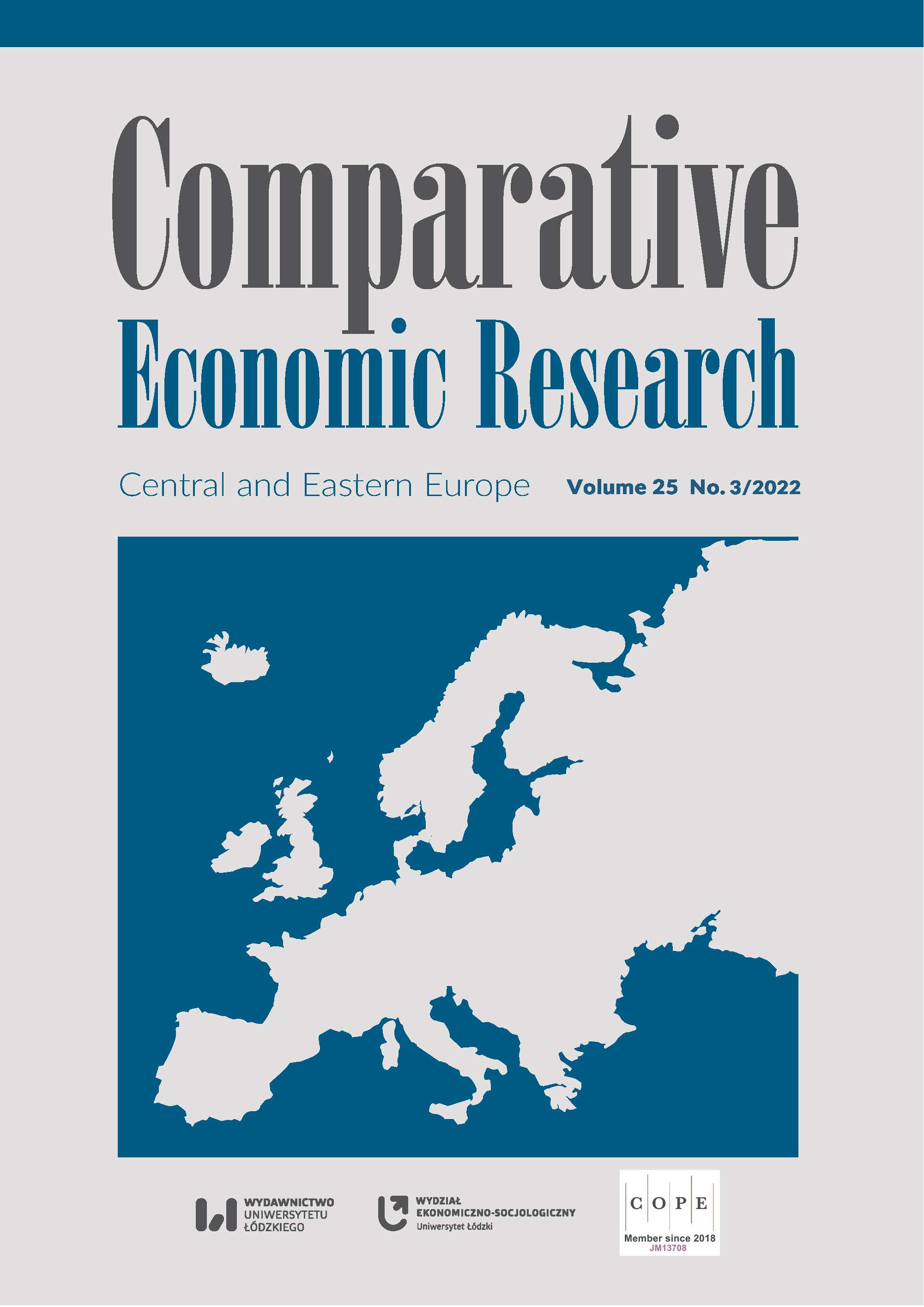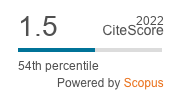Generalized Trust, Helpfulness, Fairness and Growth in European Countries A Revised Analysis
DOI:
https://doi.org/10.18778/1508-2008.25.25Keywords:
bridging social capital, trust, helpfulness, fairness, economic growth, EuropeAbstract
This research is an attempt to assess the impact of trust, helpfulness, and fairness on economic growth in Europe. The first part of the paper highlights the concept of social capital and the related concept of trust, while the second part gives an overview of selected research hitherto conducted on the subject. The third part presents an econometric growth model based on a modified Cobb‑Douglas production function. The model we propose includes three interrelated variables: generalized trust, helpfulness, and fairness, which can be combined into an aggregated variable, called ‘cooperation capital’. The pooled sample covers the years 2006–2018 and includes 22 European countries. European Social Survey data provides a chance to examine the previously inaccessible measurement of the impact of bridging social capital increase on economic growth. The results suggest that approximately 1/8 of economic growth (measured by the GDP growth rate) may be ascribed to the effect of an increase in cooperation capital. In addition, 86% of this effect occurs with a 1–4 year lag. The three‑component cooperation capital explains economic growth better than generalized trust exclusively. The estimated model suggests that an increase in helpfulness among people has the largest impact on economic growth. As the outcomes of this research also clearly show, fairness and trust are key factors for economic growth in Europe.
Downloads
References
Ahn, T.K., Ostrom, E. (2008), Social capital and collective action, [in:] D. Castiglione, J.W. Van Deth, G. Wolleb (eds.), The Handbook of Social Capital, Oxford University Press, Oxford, pp. 70–100.
Google Scholar
Ambroziak, E., Starosta, P. Sztaudynger, J.J. (2016), Zaufanie, skłonność do pomocy i uczciwość a wzrost gospodarczy w Europie, “Ekonomista”, 6, pp. 647–673.
Google Scholar
Axelrod, R. (1984), The evolution of co‑operation, Basic Books, New York.
Google Scholar
Barro, R.J. (2013), Education and economic growth, “Annals of Economics and Finance”, 14, pp. 301–328.
Google Scholar
Barro, R.J., Sala‑i‑Martin, X. (1995), Economic growth, McGraw‑Hill, New York.
Google Scholar
Berggren, N., Elinder, M., Jordahl, H. (2008), Trust and growth: a shaky relationship, “Empirical Economies”, 35, pp. 251–274, https://doi.org/10.1007/s00181-007-0158‑x
Google Scholar
DOI: https://doi.org/10.1007/s00181-007-0158-x
Beugelsdijk, S., Schaik, T. van (2005), Social capital and growth in European regions: an empirical test, “European Journal of Political Economy”, 21 (2), pp. 301–324, https://doi.org/10.1016/j.ejpoleco.2004.07.004
Google Scholar
DOI: https://doi.org/10.1016/j.ejpoleco.2004.07.004
Bjørnskov, Ch. (2009), Social trust and the of schooling growth, “Economics of Education Review”, 28 (2), pp. 249–257, https://doi.org/10.1016/j.econedurev.2006.09.013
Google Scholar
DOI: https://doi.org/10.1016/j.econedurev.2006.09.013
Bjørnskov, Ch. (2012), How Does Social Trust Affect Economic Growth?, “Southern Economic Journal”, 78 (4), pp. 1346–1368, https://doi.org/10.4284/0038-4038-78.4.1346
Google Scholar
DOI: https://doi.org/10.4284/0038-4038-78.4.1346
Bjørnskov, Ch. (2017), Social Trust and Economic Growth, [in:] E.M. Uslaner (ed.), The Oxford Handbook of Social and Political Trust, Oxford University Press, Oxford, pp. 535–555, https://doi.org/10.1093/oxfordhb/9780190274801.013.24
Google Scholar
DOI: https://doi.org/10.1093/oxfordhb/9780190274801.013.24
Blau, P.M. (1964), Exchange and power in social life, John Wiley & Sons, Inc., New York.
Google Scholar
Boulila, G., Bousrih, L., Trabelsi, M. (2008), Social capital and economic growth: empirical investigations on the transmission channels, “International Economic Journal”, 22 (3), pp. 399–417, https://doi.org/10.1080/10168730802287994
Google Scholar
DOI: https://doi.org/10.1080/10168730802287994
Bourdieu, P. (1986), The forms of capital, [in:] C. Richardson (ed.), Handbook of theory and research for Sociology of Education, Greenwood Press, Westport, pp. 241–258.
Google Scholar
Braithwaite, V. (1998), Communal and Exchange Trust Norms; Their Value Base and Relevance to Institutional Trust, [in:] V. Braithwaite, M. Levi (eds.), Trust and Governance, Russell Sage Foundation, New York, pp. 46–74.
Google Scholar
Butler, J.V., Giuliano, P., Guiso, L. (2016), The Right Amount of Trust, “Journal of the European Economic Association”, 14 (5), pp. 1155–1180, https://doi.org/10.1111/jeea.12178
Google Scholar
DOI: https://doi.org/10.1111/jeea.12178
Calderon, C., Chong, A., Galindo, A. (2001), Structure of and development of financial institutions and links with trust: cross‑country evidence, “Inter‑American Development Bank, Research Department, Working Papers”, No. 444.
Google Scholar
Coleman, J.S. (1988), Social Capital in Creation of Human Capital, “American Journal of Sociology”, 94, pp. 95–120, https://doi.org/10.1086/228943
Google Scholar
DOI: https://doi.org/10.1086/228943
Coleman, J.S. (1994), Foundations of social theory, The Belkanap Press of Harvard University Press, Cambridge.
Google Scholar
Cook, K.S., Cooper, R.M. (2003), Experimental studies of cooperation, trust and social exchange, [in:] E. Ostrom, J. Walker (eds.), Trust and reciprocity, Russell Sage Foundation, New York, pp. 209–244.
Google Scholar
Cui, W. (2017), Social Trust, Institution, and Economic Growth: Evidence from China, “Emerging Markets Finance and Trade”, 53 (6), pp. 1243–1261, https://doi.org/10.1080/1540496X.2016.1264299
Google Scholar
DOI: https://doi.org/10.1080/1540496X.2016.1264299
Daskalopoulou, I. (2019), Individual‑Level Evidence on the Causal Relationship Between Social Trust and Institutional Trust, “Social Indicators Research”, 144, pp. 275–298, https://doi.org/10.1007/s11205-018-2035-8
Google Scholar
DOI: https://doi.org/10.1007/s11205-018-2035-8
Durlauf, S.N., Fafchamps, M. (2005), Social Capital, [in:] P. Aghion, S.N. Durlauf (eds.), Handbook of Economic Growth. Vol. 1B, Elsevier, Amsterdam, pp. 1639–1699, https://doi.org/10.1016/S1574-0684(05)01026-9
Google Scholar
DOI: https://doi.org/10.1016/S1574-0684(05)01026-9
European Social Survey (2014), Weighting European Social Survey Data, https://www.europeansocialsurvey.org/docs/methodology/ESS_weighting_data_1.pdf (accessed: 15.05.2021).
Google Scholar
Fehr, E. (2009), On the Economics and Biology of Trust, “Journal of the European Economic Association”, 7 (2–3), pp. 235–266, https://doi.org/10.1162/JEEA.2009.7.2-3.235
Google Scholar
DOI: https://doi.org/10.1162/JEEA.2009.7.2-3.235
Fukuyama, F. (1995), Trust: The Social Virtues and The Creation of Prosperity, Free Press Paperbacks, New York.
Google Scholar
Gambetta, D. (2010), Can we Trust Trust?, [in:] E. Ostrom, T.K. Ahn (eds.), Foundations of social capital, Edward Elgar, Cheltenham, pp. 274–290.
Google Scholar
Gorodnichenko, Y., Roland, G. (2011), Which Dimensions of Culture Matter for Long‑Run Growth?, “American Economic Review”, 101 (3), pp. 492–498, https://doi.org/10.1257/aer.101.3.492
Google Scholar
DOI: https://doi.org/10.1257/aer.101.3.492
Granovetter, M. (1985), Economic action and social structure: The problem of embeddedness, “American Journal of Sociology”, 91 (1), pp. 481–510.
Google Scholar
DOI: https://doi.org/10.1086/228311
Guizo, L., Sapienza, P., Zinagales, L. (2000), The role of social capital in financial development, “NBER Working Papers”, No. 7563, National Bureau of Economic Research, Cambridge, https://doi.org/10.3386/w7563
Google Scholar
DOI: https://doi.org/10.3386/w7563
Gur, N., Bjørnskov, Ch. (2017), Trust and delegation: Theory and evidence, “Journal of Comparative Economics”, 45 (3), pp. 644–657, https://doi.org/10.1016/j.jce.2016.02.002
Google Scholar
DOI: https://doi.org/10.1016/j.jce.2016.02.002
Hardin, R. (2006), Trust, Polity Press, Cambridge.
Google Scholar
Hechter, M. (1988), Principles of Group Solidarity, University of California Press, Berkeley.
Google Scholar
Herreros, F. (2004), The problem of forming social capital: Why trust?, Palgrave, New York.
Google Scholar
DOI: https://doi.org/10.1057/9781403978806
Holden, K. (2005), Macroeconomic Forecasting, [in:] D. Bleaney, M. Steward (eds.), A Guide to Modern Economics Greenaway, Taylor & Francis e‑Library, London–New York, pp. 466–481.
Google Scholar
Knack, S., Keefer, P. (1997), Does social capital have an economic payoff? A cross‑country investigation, “Quarterly Journal of Economics”, 112 (4), pp. 1251–1288.
Google Scholar
DOI: https://doi.org/10.1162/003355300555475
Knight, J. (2001), Social Norms and the Rule of Law; Fostering Trust in a Socially Diverse Society, [in:] K.S. Cook (ed.), Trust in Society, Russell Sage Foundation, New York, pp. 354–373.
Google Scholar
Macek, P., Markova, I. (2006), Trust and distrust in old and new democracies, [in:] I. Markova (ed.), Trust and democratic transition in post‑communist Europe, Oxford University Press, Oxford, pp. 173–194.
Google Scholar
Marshall, A. (1920), Industry and trade, Macmillan, London.
Google Scholar
Misztal, B. (1998), Trust in modern societies, Polity Press, Cambridge.
Google Scholar
Nerlove, M. (1972), Lags in Economic Behavior, “Econometrica”, 40 (2), pp. 221–251, https://www.jstor.org/stable/1909403 (accessed: 23.05.2020).
Google Scholar
DOI: https://doi.org/10.2307/1909403
North, D.H. (1990), Institutions. Institutional change and economic performance, Cambridge University Press, Cambridge.
Google Scholar
DOI: https://doi.org/10.1017/CBO9780511808678
Paxton, P. (1999), Is Social Capital Declining in the United States? A Multiple Indicator Assessment, “American Journal of Sociology”, 105 (1), pp. 88–127, https://doi.org/10.1086/210268
Google Scholar
DOI: https://doi.org/10.1086/210268
Polanyi, K. (2001), The great transformation, Beacon Press, Boston.
Google Scholar
Putnam, R.D. (1993), Making democracy work: Civic traditions in modern Italy, Princeton University Press, Princeton.
Google Scholar
DOI: https://doi.org/10.1515/9781400820740
Putnam, R.D. (2000), Bowling alone: the collapse and revival of American community, Simon & Schuster, New York, https://doi.org/10.1145/358916.361990
Google Scholar
DOI: https://doi.org/10.1145/358916.361990
Sarel, M. (1996), Nonlinear Effects of Inflation on Economic Growth, “IMF Staff Papers”, No. 43, pp. 199–215.
Google Scholar
DOI: https://doi.org/10.2307/3867357
Schultz, T.W. (1961), Investment in Human Capital, “American Economic Review”, 51 (1), pp. 1–17.
Google Scholar
Sidrauski, M. (1967), Inflation and Economic Growth, “Journal of Political Economy”, 75, pp. 796–810, https://doi.org/10.1086/259360
Google Scholar
DOI: https://doi.org/10.1086/259360
Simmel, G. (1908), Sociology, Duncker & Humblot, Leipzig.
Google Scholar
Simmel, G. (1997), Filozofia pieniądza, Fundacja Humaniora, Poznań.
Google Scholar
Stigum, B.P. (2003), Econometrics and the Philosophy of Economics: Theory‑Data Confrontations in Economics, Princeton University Press, Princeton.
Google Scholar
DOI: https://doi.org/10.1515/9781400873234
Sztompka, P. (2007), Zaufanie. Podstawa społeczeństwa, Wydawnictwo Znak, Kraków.
Google Scholar
Tabellini, G. (2010), Culture and Institutions. Economic Development in the Regions of Europe, “Journal of the European Economic Association”, 8 (4), pp. 677–716, https://doi.org/10.1111/j.1542-4774.2010.tb00537.x
Google Scholar
DOI: https://doi.org/10.1111/j.1542-4774.2010.tb00537.x
Uslaner, E.M. (2008), Trust as a moral value, [in:] D. Castiglione, J.W. Van Deth, G. Wolleb (eds.), The handbook of social capital, Oxford University Press, Oxford, pp. 101–121.
Google Scholar
Warren, M.E. (2008), The nature and logic of bad social capital, [in:] D. Castiglione, J.W. Van Deth, G. Wolleb (eds.), The handbook of social capital, Oxford University Press, Oxford, pp. 122–149.
Google Scholar
Watier, P., Markova, I. (2006), Trust as a psychological feeling; Socialization and totalitarianism, [in:] I. Markova (ed.), Trust and democratic transition in Post‑Communist Europe, Oxford University Press, Oxford, pp. 25–46.
Google Scholar
Whiteley, P.F. (2000), Economic Growth and Social Capital, “Political Studies”, 48 (3), pp. 433–466, https://doi.org/10.1111/1467-9248.00269
Google Scholar
DOI: https://doi.org/10.1111/1467-9248.00269
Zak, P.J., Knack, S. (2001), Trust and Growth, “The Economic Journal”, March, pp. 295–321, https://doi.org/10.1111/1468-0297.00609
Google Scholar
DOI: https://doi.org/10.1111/1468-0297.00609
Downloads
Published
How to Cite
Issue
Section
License

This work is licensed under a Creative Commons Attribution-NonCommercial-NoDerivatives 4.0 International License.











